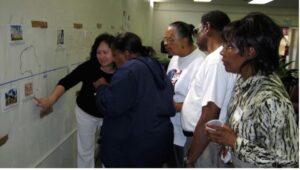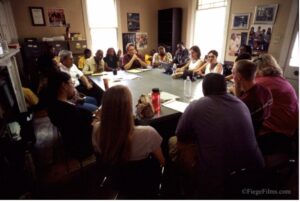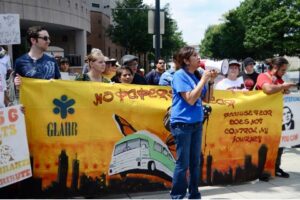 Director of the GCPR, Department of Anthropology
Director of the GCPR, Department of Anthropology
Director, Angela Stuesse is a cultural anthropologist broadly interested in social inequality in the Americas and specializing in the methodologies of activist research. Associate Professor of Anthropology and Global Studies and Advisory Board Member of the Latina/o Studies Program, much of Stuesse’s work has explored how new Latinx migration to the U.S. South has shaped and been shaped by the region’s racial hierarchies. Her first book, Scratching Out a Living: Latinos, Race, and Work in the Deep South, based on six years of politically engaged research with poultry workers and their allies, explores how Latin American migration into Mississippi’s poultry industry has impacted communities and prospects for worker organizing. Her more recent work investigates the intensification of immigrant policing in the South, with an emphasis on racialized effects and community responses, and the experiences of undocumented young people in higher education. In 2018 she co-founded UndocuCarolina, which works to increase visibility, support, and resources for members of the Carolina community living with the effects of undocumentation. She is committed to involving students in participatory, politically engaged research and believes deeply in the transformative potential of experiential learning.
How did you start doing participatory research?
I was very fortunate to be at the University of Texas at a time when the “Austin School” of activist research was in formation. Studying with mentors Charles R. Hale, Shannon Speed, Edmund T. Gordon, and João Costa Vargas alongside a cohort of other graduate students committed to politically engaged research, I had the opportunity to think deeply about and experiment with the possibilities for collaborative research with communities in struggle. It was in this context that I carried out my dissertation work with poultry workers and their allies in rural Mississippi, activist research that formed the basis of my first book, Scratching Out a Living.
What is the value of the Graduate Certificate in Participatory Research, in your view?
This Certificate Program’s unique value is that it brings a diversity of faculty and students from all across the university together with community collaborators to consider the theory and method of carrying out research in equitable partnership with (not on) communities. I love the sense of camaraderie in our multidisciplinary, team-taught classes, where students in nursing, occupational therapy, and public health have opportunities to learn with and from peers in anthropology, geography, communication, and library & information sciences. The GCPR cultivates community with others from within and beyond the university who care deeply about participatory and community-based research and nurtures the development of perspectives and skills for conducting such work. In it I have found a home at UNC.
What are your current participatory research projects?
I am currently co-writing a book, tentatively titled #FreeDany: Dreaming and Detention in Dixie with Daniela A. Vargas, who I’ve known since she first immigrated to the US from Argentina at age 7. #FreeDany charts, through the experiences of one young person and her family, how the lives of undocumented youth in the twenty-first century U.S. South have been indelibly shaped by the country’s discourses and policies on immigration. Dany and her family have been instrumental in teaching me about the realities and repercussions of restrictive U.S. immigration law over the past two decades, and our present collaboration underscores the value of longitudinal research relationships.
Our work together is also deepening my development as an activist scholar in at least two ways. First, our co-authorship—part ethnography, part testimonio—strives to expand the methodological horizons of collaborative scholarship by embracing and examining the ethical challenges and opportunities of co-writing. Second, I am working to be more effective at bringing the perspectives gained from politically-engaged, community-based research to the communities where this knowledge can be used to challenge conditions of social exclusion and demand a more just world. In the case of #FreeDany, this has entailed studying the genre of creative nonfiction, learning how to write more compelling narratives for non-academic audiences. We are writing for the millions in this country whose lives are constrained by undocumentation.
Find out more about Dr. Stuesse’s recent work and check out her website.
“I came to anthropology because of a commitment to social justice, and I always wanted to do research that contributed to progressive social change and research that worked alongside people who are organizing.” (source: book trailer)
“For me a lot of this is about, how do we relate to one another in a country, in a world that’s increasingly diverse? How do we begin to make sense of people’s different backgrounds, and perhaps our common futures?” (source: book trailer)
“I see my role as a scholar, educator, and activist as one that fosters long-term engagement with communities, engages in critical theory production, empowers students to reflect and act, and brings these three into dialogue to change the conditions that create and maintain social inequality.”



As part of Dr. Stuesse’s work with the Mississippi Poultry Worker’s Center she helped lead popular education workshops with community members.
“These workshops were both a product of the research, and they also became an opportunity to learn more about this question of how people are understanding each other and the potential for organizing in this context.”